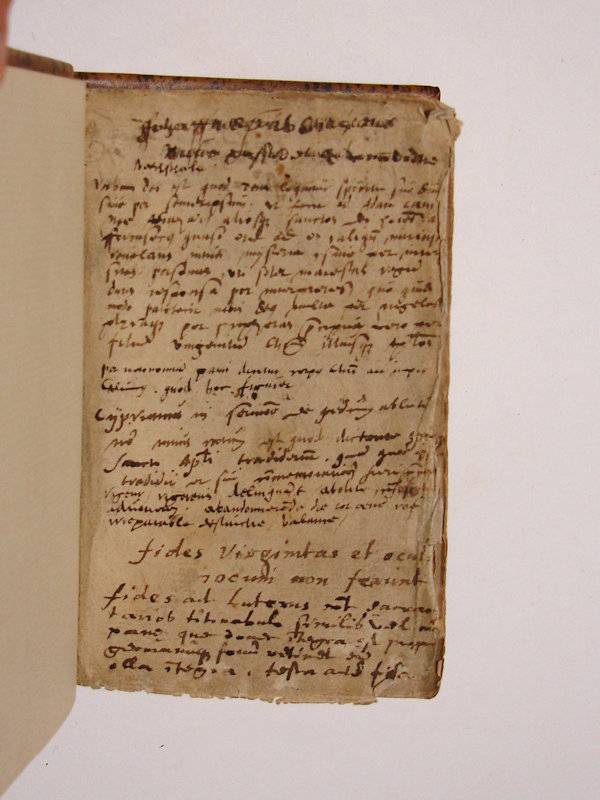SULPICIUS SEVERUS.
Sulpitii Severi Aquitani Sacrae Historiae a mundi exordio ad sua usq; tempora deductae, libri duo; item Dorothei Episcopi Tyri, qui sub Constantino Magno vixit, De vita Prophetarum & Apostolorum, Synopsis. Quibus accessit rerum & verborum index copiosus.
Paris (Parisiis), Apud Gulielmum Guillard & Almaricum Warencore, 1560.
Small 8vo. (XXXII),156,(2 blank);(24 index) p. Modern hardbound binding. 13.5 cm 'A universal chronicle which is an important source for the history of 4th-century events' (
Ref: USTC 153005; Ebert 22005; Schoenemann 2,378/79) (
Details: Back with 4 raised bands, and with a gilt short title in the second 'compartment') (
Condition: Old inscriptions on the front flyleaf. Front flyleaf worn, thumbed and dustsoiled. Title also thumbed and dustsoiled, and with an old ownership entry and shelf number) (
Note: The Latin historian Sulpicius (or Sulpitius) Severus was born in Aquitania ca. 360 A.D. He organized under the influence of Bishop Martinus of Tours a sort of monastic life on his own estate for himself and his friends. His extant works are a 'vita S. Martini Turonensis', and this 'Sacrae Historiae', a kind of universal chronicle to A.D. 402, 'which is an important source for the history of 4th-century events, (...). The whole book is an interesting attempt to present a 'breviarium' of history from the Christian point of view: it uses Christian chronographers, especially St. Jerome, but also Pagan writers. J. Bernays suggested that for the destruction of Jerusalem in A.D 70 Sulpicius followed the lost account of Tacitus. Sallust and Tacitus are his models in the matter of style'. (OCD, 2nd 3d. p. 983)
§ The 'Sacrae Historiae' were first published in Basel in 1556 by the Ilyrian protestant scholar Mat(t)hias Flacius, the latinized slavic name Vlacich, from a old manuscript found in a library in Hildesheim. Flacius, 1520-1575, who taught Hebrew in Wittenberg and the New Testament in Jena, was a pupil and lifelong supporter of Luther. Flacius dedicated his book to the Polish duke Nicolaus Radziuilius, who was a great patron of the Lutherans. (Neue Deutsche Biographie 5 (1961), p. 220-222) Schoenemann's opinion is that Flacius 'accurata fide hos libros exprimendos curavit'. (Schoenemann p. 378) The next edition of the 'Sacrae Historiae', this edition, appeared a few years later, in Paris in 1560. In the 32 page 'praefatio' to this edition, which is in fact a ferocious attack against Lutheranism, that brought nothing but 'latrocinia, furta, praedationes, adulteria, usurae, homicidia & id genus alia flagitia' (p. 2* recto), written by one 'Iacobus Faber doctor theologus, Sorbonicus' we are told that he (Faber) published this work to strengthen the spirit of the Catholics against the heresy of the Reformation, that was raging through Europe, and especially Germany. (p. *3 recto) Faber suggests that he found and edited the text of the 'Sacrae Historiae' himself. ('cuius sacram historiam cum in publicum omnium catholicorum commodum evulgare ex mediis antiquorum seculorum abditissimis scriniis erutam cogitaremus', p. 2*3 recto & verso) Schoeneman explains that the catholic professor of the Sorbonne was a common thief, who misappropriated the edition of his protestant precursor Flacius, without any acknowledgment. ('partam Matthiae Flacio gloriam suffurari non erubuit', Schoenemann p. 379). Schoenemann calls the praefatio of Faber nothing but 'emendicatus pannus', 'begged for rags' (pun for 'emendicatus panis'?) (
Provenance: On the title: 'Conv.s ff. erem. s. Aug.ni Bruxell. 1610', indicating that the book once belonged to the convent of the Order of the Eremites of St. Augustine in Brussels.
§ On the front flyleaf the old names: 'Van den Boom', and 'P. v(an)d(en) Hoogen ex Horsten, 18/12/'25') (
Collation: *-2*8, A-T8, V4 (last leaf V4 blank), +8, 2+4)(Photographs on request)
Book number: 120316 Euro 700.00
Keywords: (Oude Druk), (Rare Books), Aquitania, Gallia, Gallien, Gaul, Kirchengeschichte, Spätantike, alte Geschichte, ancient history, antike altertum antiquity, church history, late antiquity
 SULPICIUS SEVERUS.
SULPICIUS SEVERUS.